NOTE BIOGRAFICHE:
Nato presumibilmente nel dicembre del 1562 o il 2 gennaio 1563 a Dalkey, Dublino –mentre per altre fonti sarebbe nativo di Westminster- e morto il 20 febbraio 1626 a Londra, John Dowland è stato un compositore, cantore e liutista di origine irlandese o inglese ed è riconosciuto come uno dei musicisti più importanti del suo tempo. Non ancora ventenne entra al servizio del diplomatico Sir Henry Cobham, che dal 1579 ricopre l’incarico di ambasciatore inglese a Parigi; lì, Dowland, si converte al cattolicesimo per ripicca nei confronti della regina Elisabetta I, poiché non gli volle offrire l’incarico di musicista presso la corte inglese.
Da questo episodio si può dedurre che probabilmente il nostro fosse inglese di nascita e non di origini irlandesi, inoltre nasce una trentina d’anni dopo la Riforma Protestante (1533-1538) di Enrico VIII che porta alla persecuzione e al quasi totale annientamento della Chiesa Cattolica in Irlanda.
Qualche anno dopo lo troviamo in Inghilterra, ammogliato; nel 1588 gli viene concesso il baccellierato (dottorato) in musica dal Christ Church College di Oxford e poi successivamente da Cambridge intorno al 1597. Nel 1594 fa probabilmente il suo secondo tentativo richiedendo invano l’incarico di liutista di corte presso la Regina che lo rifiuta nuovamente. Quindi si sposta in Italia grazie all’opportunità di soggiorno che gli offre il duca di Brunswick. Visita Venezia, dove conosce e stringe amicizia con il compositore Giovanni della Croce e riceve anche un invito a Roma da Luca Marenzio, com’è testimoniato dalla lettera di quest’ultimo nella prefazione di First Booke of Songes or Ayres (raccolta di composizioni di Dowland), ma è costretto a rifiutare a causa di un improvviso richiamo in patria. Una volta tornato in Inghilterra abiura il cattolicesimo, ciò però non gli porta vantaggi immediati, poiché prima di conquistare finalmente l’ambìto posto di liutista presso la corte inglese, nel 1598 lo vediamo impegnato al servizio di Cristiano IV di Danimarca. Solo nel 1612 riesce a realizzare l’aspirazione di tutta una vita presso la corte di Giacomo I d’Inghilterra e suo figlio, Robert Dowland, lo sostituirà quando morirà nel 1626, ereditandone l’incarico.
OPERE MUSICALI:
I testi delle sue canzoni trattano come temi ricorrenti argomenti di carattere amoroso e intimo e raggiunge l’apice dell’espressione nella parte strumentale delle sue composizioni per mezzo di linee melodiche semplici che però non oscurano il significato delle parole.
La sua produzione musicale si suddivide in composizioni per liuto solista (tutte quelle che ci sono pervenute sono molto più numerose di quelle di ogni altro compositore inglese e compaiono su quasi tutti i manoscritti di musica per liuto dal 1595), composizioni per consort strumentale caratterizzate da espressione poetica elevata e raffinata sensibilità e raggruppate nella raccolta “Lachrimae or Seaven Teares figured in Seven Passionate Pavans” per cinque viole o violini e liuti, e infine, i tre libri di canzoni per voce e liuto: The First Booke of Songes or Ayres for four parts and lute (1597), Second Booke of Songes (1600) e Third and Last Booke of Songes (1603).
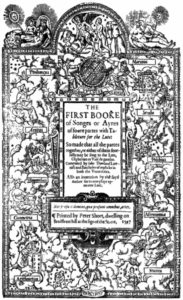
La più famosa tra le sue melodie è sicuramente la “Pavana Lachrimae”, composta inizialmente per solo liuto, poi per voce e liuto (sul quale fu costruito il testo di “Flow My Tears”) e infine per mixed consort. A questo brano, Dowland, era talmente affezionato da firmarsi occasionalmente come “Jo. Dolandi de Lachrimae”.
Flow My Tears, John Dowland: https://youtu.be/jkRrzAo9Wl4
Altri suoi brani divenuti celebri come “Can she excuse my wrongs” (The Earl of Essex, His Galliard) e “Now, o now, I needs must part” (The Frog Galliard) sono invece contenuti nel primo libro della sua trilogia. L’ultima opera pubblicata da Dowland è la raccolta A Pilgrim’s Solace del 1612, anch’essa di canzoni per voce e accompagnamento strumentale.
Can she excuse my wrongs: https://youtu.be/PsQzULr6ZLE
Now, o now, I needs must part: https://youtu.be/gAVwnkwneuA
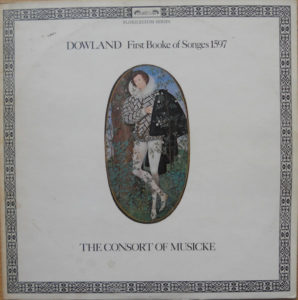
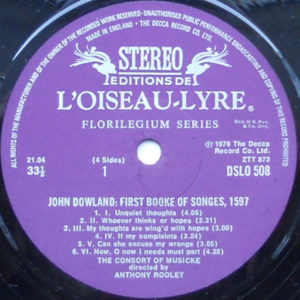
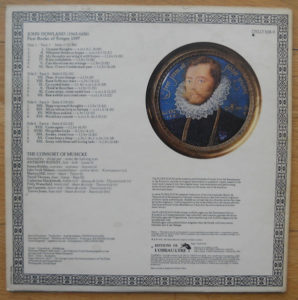
Dowland, inoltre, amava definirsi infelice inglese e la sua figura malinconica e irrequieta, caratterizzata da una vita enigmatica ed errabonda, si manifesta addirittura consapevolmente, concretizzandosi autobiograficamente nel titolo di una sua famosa pavana per liuto, Semper Dowland Semper Dolens; giocando sull’assonanza del proprio nome con la parola dolens, dichiarava, di fatto, il suo costante status di intimo dolore.
JOHN DOWLAND E LA SUA “EREDITÀ” NELLA MUSICA ODIERNA:
La musica di John Dowland si distingue per l’atmosfera inquieta che genera e rappresenta pienamente le caratteristiche dell’espressione artistica nella cultura dell’Inghilterra del XVI secolo che era ossessionata dalla malinconia: infatti era considerata elemento tipico di un individuo superiore e maturo che è capace di “sentire profondamente”. Inoltre un vecchio proverbio inglese esprime che “è pazzo colui che non è malinconico almeno una volta al giorno” e come ipotizza Voltaire forse l’attaccamento alla “disperazione inglese” – vedi testo di “Time” dei Pink Floyd- è influenzato anche dal tempo atmosferico: “questi sono i giorni bui di novembre in cui gli inglesi si impiccano”.
Questo sentimento così avvertito dagli inglesi dell’epoca e così profondamente radicato, anima la musica di Dowland e costituisce gran parte delle emozioni che trasmette, fino ad arrivare, come vedremo, ai giorni nostri. Dowland ha influenzato indirettamente la musica pop odierna inglese proprio per la struttura “semplice” delle sue composizioni costituite principalmente da voce accompagnata dal liuto, arrivando nella modernità remotamente fino ai The Beatles, come certa critica ha rilevato.
«Penso che dobbiamo molto a John Dowland, come la figura del cantautore alienato, che è qualcosa che ha praticamente inventato. Facciamo parte di quella tradizione. Dowland è il papà di tutti noi cantautori inglesi, un grande artista vagabondo e viaggiatore che con le sue meravigliose melodie è diventato il re del pop del 1600. Consciamente o no veniamo tutti dalle sue radici».
Qui, come detto da Sting (musicista che, tra l’altro, ha prodotto una raccolta di rivisitazioni delle composizioni del nostro), Dowland ha influenzato e continua a influenzare gruppi moderni nella musica pop, nel post-punk con i Joy Division (’70), nell’alternative rock con i The Smiths (‘80) eccetera; per non parlare della sua influenza che arriva addirittura fino al jazz di ricerca dell’avanguardia inglese, per esempio nel brano che dà il titolo all’album cult “Conference of the Birds” del contrabbassista e compositore Dave Holland oppure in progetti esplicitamente dedicatigli di altri noti esponenti dall’area quali Barry Guy e John Surman (“John Dowland: In Darkness Let Me Dwell”).
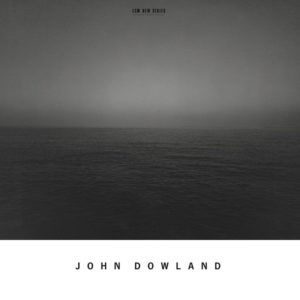
“Conference of the Birds” di Dave Holland: https://youtu.be/YYTIXJuxvgY
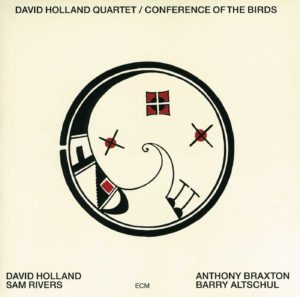
Infine la musica di Dowland fu sorprendentemente moderna anche per altri versi: è stato uno dei primi compositori, inoltre, a rendere popolare in patria il suo strumento prediletto, il liuto che ha consentito alle persone di suonare musica da sole a casa grazie alla stampa delle sue opere, vedendone così la sua diffusione (così come sarebbe stato poi per il pianoforte meno di cent’anni dopo che diffuse la cultura musicale presso la borghesia).
CURIOSITÀ:
Anche il grande scrittore di fantascienza, il profeta visionario dei nostri tempi Philip K. Dick, per alcuni anni disc-jockey di musica classica per un’emittente californiana, fu un grande estimatore della musica di Dowland, a tal punto che intitolò uno dei suoi capolavori “Flow My Tears, The Policeman said“.
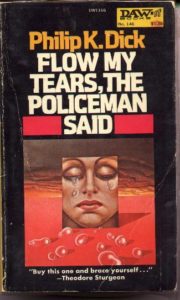
BIBLIOGRAFIA:
- Dizionario Enciclopedico della musica e dei musicisti (UTET), Le Biografie II (BUS-FOX);
- The Oxford Dictionary of Music di Michael Kennedy, new edition.
SITOGRAFIA:
- http://www.bbc.com/culture/story/20170801-the-ed-sheeran-of-16th-century-england
- https://it.wikipedia.org/wiki/John_Dowland
- https://www.britannica.com/biography/John-Dowland
- http://www.treccani.it/enciclopedia/john-dowland_%28Enciclopedia-Italiana%29/
- http://harmoniaeweb.blogspot.com/2013/07/john-dowland.html
JOHN DOWLAND: THE ELIZABETHAN BARD
BIOGRAPHICAL NOTES:
John Dowland (December 1562-February 1626) was a composer, singer and lutenist and is known as one of the most relevant musicians of his time. It remains unclear if his origins were English or Irish as different sources are claiming he was born either in Westminster or Dalkey.
Not yet in his twenties, he takes service with the diplomatic Henry Cobham, who, since 1579 had held the position of ambassador in Paris; here, Downland converts to Catholicism to take revenge on queen Elizabeth I, because she refused to offer him a place at the English court. From this episode it can be deduced that he was probably English and not Irish, furthermore he was born about thirty years after the Protestant Reform (1533-1538) implemented by Henry VIII which led to the persecution and to the almost-total annihilation of the Catholic Church in Ireland.
Some years later he is in England, married. In 1588 he is given the bachelor’s degree in music by the Christ Church College of Oxford and subsequently by Cambridge around the year 1597. By 1594, he makes a second attempt asking again the queen for the role of court lutenist but she newly rejects him. So he moves to Italy thanks to the Duke of Brunswick,who gave him the opportunity to visit the country. He stays in Venice, where he meets and becomes friend of the composer St. John of the Cross, he even receives an invitation to Rome by Luca Marenzio as it is proved by the finding of a letter in Dowland’s First Books of Songs or Ayres’s Preface. He has to refuse because of a sudden call from home.On his return to England he abjures his Catholic faith, but this move doesn’t bring immediate benefits to him, because before finally conquering his aspired role, by 1598 we see him engaged in the service of Christian IV of Denmark. Only by 1612 Dowland succeeds in achieving the aspiration of all his life becoming the lutenist at the court of James I of England and his son Robert Dowland will replace him when he dies in 1626, inheriting his role.
MUSICAL WORKS:
His songs’ lyrics deal with recurrent topics of intimate and romantic nature and reach its peak of expression in the instrumental part of his compositions by the means of simple melody lines that do not hide the meaning of the words. His musical production Is divided into 3 categories:
-Compositions for solo lute, which are much more numerous than those of any other English composer and appeared in almost all lute music manuscripts starting from 1595;
-Compositions for instrumental consort characterized by elevated poetic expression and sublime sensitivity, they are collected in the publication “Lachrimae or Seaven Teares figured in Seven Passionate Pavans” for five violas or violins and lute, dated 1604;
-Last but not least there are the three books of songs for voice and lute: The First Booke of Songes or Ayres for four parts and lute (1597), Second Booke of Songes (1600) and The Third and Last Booke of Songes (1603).
“Pavana Lachrimae” is surely the most famous of his melodies, it was firstly composed for solo lute, then for voice and lute (on which the Tema of “Flow My Tears”is constructed) and lastly for mixed consort. Dowland was so attached to this passage that he used to occasionally sign his name as “Jo. Dolandi de Lachrimae”.
Flow My Tears, John Dowland: https://youtu.be/jkRrzAo9Wl4
Other tracks that became famous such as “Can She Excuse My Wrongs” (The Earl of Essex, His Galliard) and “Now, o now, I needs must part” (The Frog Galliard) are preserved in the first book of his trilogy. The publication on “A Pilgrim’s Solace” (1612) is the last work published by Dowland, for voice and instrumental backing. Dowland also loved referring to himself as “the unhappy Englishman” and his melancholy and restlessness, characterized by an enigmatic and wandering life, can be seen in the title of his famous pavan for lute, Semper Dowland Semper Dolens: by playing on the assonance of his name with the word dolens, he declares his constant status of intimate pain.
“Can She Excuse My Wrongs“: https://youtu.be/PsQzULr6ZLE
“Now, o now, I needs must part“: https://youtu.be/gAVwnkwneuA
JOHN DOWLAND AND HIS LEGACY IN MODERN MUSIC:
John Dowland’s music stands out for the restless atmosphere that it creates as well as it fully represents the typical features of the artistic expression in the culture of seventeenth century England, which was obsessed with melancholia: in fact it was considered the typical element of a superior and mature individual who is capable of “feeling deeply”. Furthermore an old English proverb says that “he is a fool who is not melancholic once a day” and as Voltaire suggests, the emotional attachment for “hanging on in quiet desperation in the English way” -look up “Time”‘s lyrics by Pink Floyd- may be influenced by the weather: “These are the dark November days when the English hang themselves”. This sentiment so powerfully felt by English people at that time and so deeply rooted, animates Dowland’s music and the emotions contained in it.
Dowland indirectly influenced modern music with the “simple” structure of his compositions, which are constituted mainly of the main vocal line with the accompaniment of the lute. Dowland played an important role in modern music, as some critics have observed, finding some of his remote influences even in The Beatles.
“I think we owe a lot to Mr Dowland, as the figure of the alienated singer-songwriter is something he invented. We are part of that tradition. He is the father of all us English songwriters, a vagabond and traveller, a great artist who, with his wonderful melodies, has became the 1600’s king of Pop. Consciously or not we all come from his roots.”
Here, as Sting said (another musician who produced an album in which are collected many reinterpretations of Dowland’s compositions), Dowland has affected and continues to influence modern bands in Pop music, in the post-punk ambient, for example, Joy Division (’70), in alternative rock The Smiths (’80); not to mention his influences which involve English vanguard’s jazz, an example is the track which gives the title to the cult album “Conference of the Birds” of the jazz composer and bassist Dave Holland, or projects explicitly dedicated to him by other exponents such as Barry Guy and John Surman (“John Dowland: In Darkness Let Me Dwell”).
“Conference of the Birds” by Dave Holland: https://youtu.be/YYTIXJuxvgY
Lastly, Dowland’s music is surprisingly modern also in other aspects: he was one of the first composers to popularize in his homeland his favourite instrument, the lute which allowed people to play music by themselves at home thanks to the printed copies of his works and this led consequently to their diffusion.
FUN FACTS:
Even the visionary prophet of our times, the great science-fiction writer Philip K. Dick, who for some years has been disc-jockey of classical music for a californian radio, was great admirer of Dowland’s music so much that he titled one of his masterpieces “Flow My Tears, the Policeman Said“.
Anche il profeta visionario dei nostri tempi, il grande scrittore di fantascienza Philip K. Dick, per alcuni anni disc-jockey di musica classica per un’emittente californiana, fu un grande estimatore della musica di Dowland, a tal punto che intitolò uno dei suoi capolavori “Flow My Tears, the Policeman Said“.
BIBLIOGRAPHY:
- World Dictionary Encyclopedia of Music and Musicians (UTET), The Bibliographies II (BUS-FOX);
- The Oxford Dictionary of Music new edition, Michael Kennedy.
SITOGRAPHY:
- http://www.bbc.com/culture/story/20170801-the-ed-sheeran-of-16th-century-england
- https://en.wikipedia.org/wiki/John_Dowland
- https://www.britannica.com/biography/John-Dowland
- http://www.treccani.it/enciclopedia/john-dowland_%28Enciclopedia-Italiana%29/
- http://harmoniaeweb.blogspot.com/2013/07/john-dowland.html
ARTICOLO DI AURORA LEA SOLANI DELLA CLASSE III B DEL LICEO CLASSICO


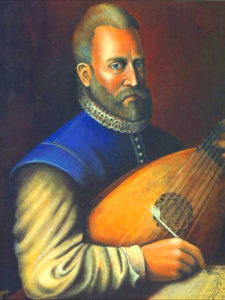
Commenti recenti